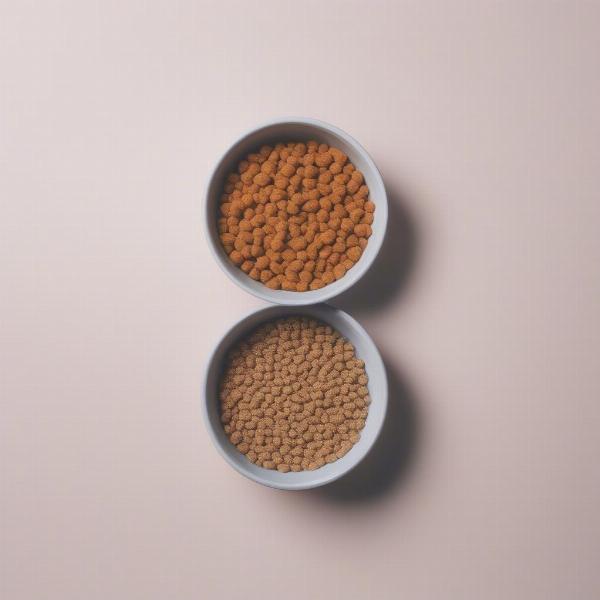Finding the right food for your new puppy can be overwhelming. You want the best for your furry friend, but the cost of premium puppy food can quickly add up. Thankfully, providing excellent nutrition for your growing pup doesn’t have to break the bank. This article will guide you through selecting the best inexpensive dog food for puppies, focusing on nutritional value and affordability. We’ll cover key ingredients to look for, brands to consider, and tips for making your puppy’s meals both healthy and budget-friendly.
Choosing an inexpensive puppy food doesn’t mean compromising on quality. Puppies need a diet rich in protein for muscle development, healthy fats for brain function and energy, and essential vitamins and minerals for overall growth. Look for foods that list meat as the first ingredient, avoiding fillers like corn, wheat, and soy, which offer little nutritional value. Chicken, lamb, fish, and beef are all excellent protein sources.
Key Nutrients for Growing Puppies
A balanced diet is crucial for a puppy’s development. Essential nutrients include:
- Protein: Supports muscle growth and repair.
- Fat: Provides energy and supports brain function.
- Calcium and Phosphorus: Essential for bone development.
- DHA: Supports cognitive development and healthy vision.
- Vitamins and Minerals: Boost the immune system and overall health.
Affordable Puppy Food Brands to Consider
While premium brands can be expensive, several affordable options provide excellent nutrition. Researching ingredients and reading reviews is crucial before making a choice. Some budget-friendly brands often recommended by veterinarians include:
- Purina Puppy Chow: A widely available and affordable option that provides complete and balanced nutrition for puppies.
- Iams ProActive Health Smart Puppy: Offers a good balance of protein, fat, and essential nutrients.
- Pedigree Puppy Complete Nutrition: Another budget-friendly choice that meets a puppy’s nutritional needs.
Always check the ingredient list and choose a formula specifically designed for puppies, as their nutritional requirements differ from adult dogs.
Making the Most of Your Budget
Tips for Stretching Your Dollar
- Buy in bulk: Larger bags of food are often cheaper per pound.
- Compare prices: Check different retailers and online stores for the best deals.
- Consider adding healthy, inexpensive supplements: Small amounts of cooked chicken, fish, or vegetables can boost your puppy’s nutrition without significantly increasing costs. Always consult your veterinarian before adding supplements to your puppy’s diet.
Common Concerns about Inexpensive Puppy Food
Is Cheap Puppy Food Safe?
While some cheap brands may skimp on essential nutrients or include harmful fillers, many affordable options provide complete and balanced nutrition. Always carefully examine the ingredient list and choose a brand that prioritizes quality ingredients.
Can I Mix Inexpensive and Premium Puppy Food?
Mixing different brands can be a good way to transition your puppy to a new food or provide some variety. However, ensure both foods are formulated for puppies and meet their nutritional requirements. Introduce the new food gradually to avoid digestive upset.
 Mixing Inexpensive and Premium Puppy Food
Mixing Inexpensive and Premium Puppy Food
Conclusion
Finding the best inexpensive dog food for puppies requires careful consideration of ingredients, brand reputation, and your budget. By focusing on essential nutrients and avoiding unnecessary fillers, you can provide your puppy with a healthy and affordable diet that supports their growth and development. Remember to always consult your veterinarian for personalized recommendations based on your puppy’s breed, size, and individual needs.
FAQ
- What is the most important nutrient in puppy food? Protein is crucial for muscle growth and development.
- Can I feed my puppy adult dog food? No, puppies have different nutritional needs than adult dogs.
- How often should I feed my puppy? Puppies typically need to eat three to four times a day.
- How do I know if my puppy is getting enough to eat? Monitor your puppy’s weight and energy levels. Consult your vet if you have concerns.
- What are some signs of a food allergy in puppies? Signs may include itchy skin, digestive upset, and ear infections.
- Can I give my puppy homemade food? It’s possible, but consult a veterinary nutritionist to ensure a balanced diet.
- When can I switch my puppy to adult dog food? Typically, puppies can transition to adult food around one year of age.
ILM Dog is your trusted resource for all things canine. We offer expert advice on dog breeds, health, training, nutrition, grooming, exercise, and much more. Whether you’re a new puppy parent or a seasoned dog owner, we provide practical, reliable information to help you care for your furry friend. Contact us today for personalized guidance and support. Email: [email protected], Phone: +44 20-3965-8624. ILM Dog is dedicated to helping you provide the best possible care for your dog, from puppyhood to senior years. We offer expert advice on a range of topics, including choosing the right dog bowl dog bowls puppy. Our comprehensive resources ensure you can confidently navigate every stage of your dog’s life. If you are looking for the perfect dog bowl modern dog bowls, we offer a variety of options to suit your dog’s needs and style. We even have specialized bowls, such as the spaniel dog bowl, and convenient combinations like the dog bowls and mat to keep your feeding area clean. Visit us at blue dog bowl to see our full selection.